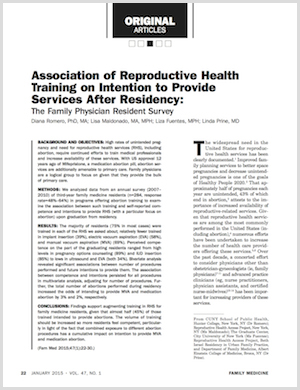Association of Reproductive Health Training on Intention to Provide Services After Residency
Romero D, Maldonado L, Fuentes L, and Prine L.
Family Medicine January 2015; Volume 27, Number 1, 22-30
Link: http://www.stfm.org/Portals/49/Documents/FMPDF/FamilyMedicineVol47Issue1Romero22.pdf
BACKGROUND AND OBJECTIVES: High rates of unintended pregnancy and need for reproductive health services (RHS), including abortion, require continued efforts to train medical professionals and increase availability of these services. With US approval 12 years ago of Mifepristone, a medication abortion pill, abortion services are additionally amenable to primary care. Family physicians are a logical group to focus on given that they provide the bulk of primary care.
METHODS: We analyzed data from an annual survey (2007– 2010) of third-year family medicine residents (n=284, response rate=48%–64%) in programs offering abortion training to examine the association between such training and self-reported competence and intentions to provide RHS (with a particular focus on abortion) upon graduation from residency.
RESULTS: The majority of residents (75% in most cases) were trained in each of the RHS we asked about; relatively fewer trained in implant insertion (39%), electric vacuum aspiration (EVA) (58%), and manual vacuum aspiration (MVA) (69%). Perceived competence on the part of the graduating residents ranged from high levels in pregnancy options counseling (89%) and IUD insertion (85%) to lows in ultrasound and EVA (both 34%). Bivariate analysis revealed significant associations between number of procedures performed and future intentions to provide them. The association between competence and intentions persisted for all procedures in multivariate analysis, adjusting for number of procedures. Further, the total number of abortions performed during residency increased the odds of intending to provide MVA and medication abortion by 3% and 2%, respectively.
CONCLUSIONS: Findings support augmenting training in RHS for family medicine residents, given that almost half (45%) of those trained intended to provide abortions. The volume of training should be increased so more residents feel competent, particularly in light of the fact that combined exposure to different abortion procedures has a cumulative impact on intention to provide MVA and medication abortion. By Diana Romero, PhD, MA; Lisa Maldonado, MA, MPH; Liza Fuentes, MPH; and Linda Prine, MD


